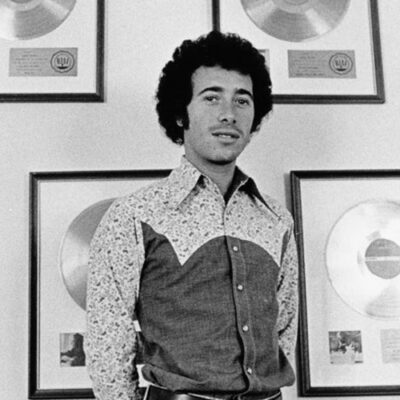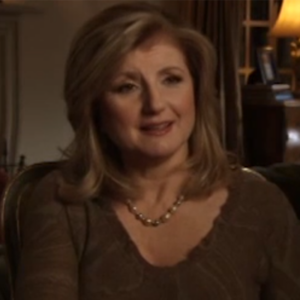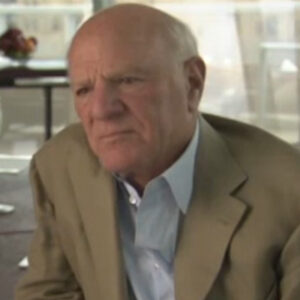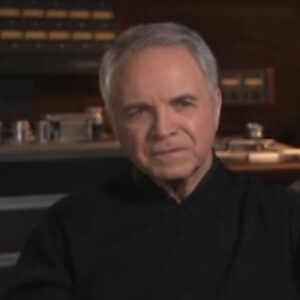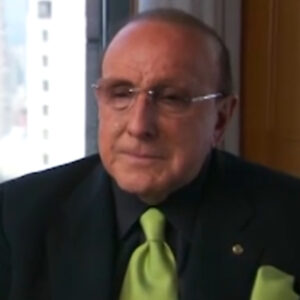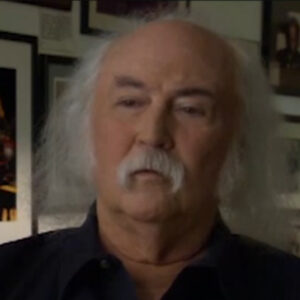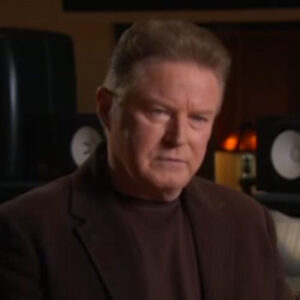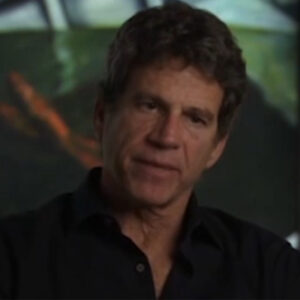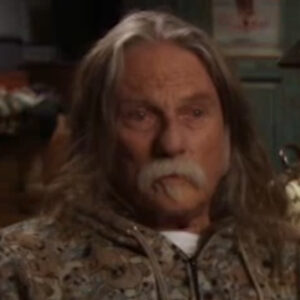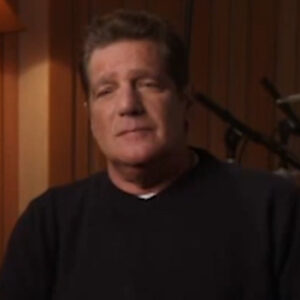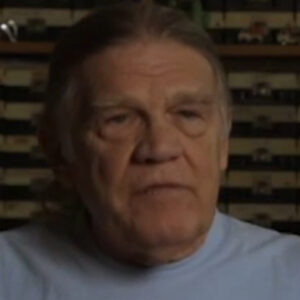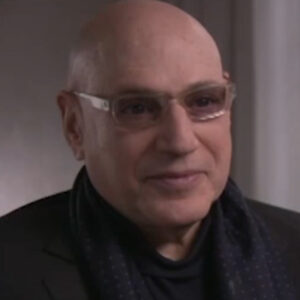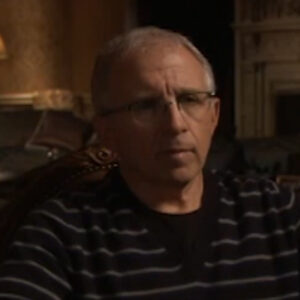Speaker Well, I think one of the greatest things about Geffen Records was the guy who, you know, own the company, came to work every day in jeans and a T-shirt. And to someone who was like 22 years old, that seemed pretty fantastic at the time. The music business in general in L.A. was pretty casual, but this was even more casual. And you didn’t feel out of place in jeans and T-shirts. And of course, every band that you went to see on the strip was also in either Leather’s jeans and ripped up T-shirts or when sort of the glam hairband started happening, a lot of the guys started dressing like girls. But you certainly weren’t out of place in jeans and a T-shirt that compared to the other. You know, other companies seem to you know, people were wearing buttoned up shirts and maybe nicer slacks and, you know, except for at the very lowest level, which would be sort of the scouts and, you know, and our people who were on the streets saying, you’re very.
Speaker You see the great things that, David, you were totally calm as you are with David. He didn’t care. He cared about the guy, whatever. You did the work. Good. He was careless, you know.
Speaker Yeah. The other the other thing about David was he accepted people for who they wore were. Let me say that again. Yeah. One to look at. OK. Also look at you, OK. So anyway, one of the other great things about working for David, you know, back in the Geffen Records days, was he accepted you for who you were. He didn’t care if you were John Kalodner looking like Jesus meets John Lennon in a white suit or you were Thom’s you taught dressed in jeans and T-shirts. You know, he obviously evaluated people based on their talents and how good they were at furthering the careers of artists and making money for his company.
Speaker So let’s back up a little bit and talk to me a little bit about. Kind of for you got the call, you know, come and work at Geffen Records. Who was this guy? David Geffen. What was your perception of him? He wasn’t a business.
Speaker When I was a teenager, I all of a sudden got really fascinated by the music business and I got a bunch of books, you know, making tracks and, you know, Clive Davis, his book Inside the Record Business. And, you know, in the many books that I read, they’re probably nine or 10 of them at the time. Star Making Machinery by Geoffrey Stokes was another one, but one of the books had a lot of stuff about David Geffen and about how, you know, he grew up in Brooklyn. And, you know, we’d go to, you know, Broadway shows and dream about, you know, being in the music business. And I thought, well, this is, you know, this is me. You know, I started off playing classical music. And then when I was 13, I got bit by the rock and roll bug. And, you know, when I was 15 or 16, I started thinking, you know, I really want to get to California where all the new music is happening in and be a part of the music business. And of all the stories I read, you know, I read when I read the story about David Geffen and where he came from, I thought, you know, well, I mean, I want to meet this guy because maybe I can learn something from him. And I can be like the Chicago equivalent of the kid from Brooklyn who came to L.A. and made it. And by that time, at 16, I was working for Warners in their warehouse in Chicago and pulling skids of albums and doing displays and record stores. And then the last thing I did was basically run the mailroom. And I knew that that was how David started by, you know, working in the mailroom. And so I hoped one day I would actually meet him.
Speaker So what did did you listen to the five artists? We were weird. I remember.
Speaker Yeah. One of the things I mean, I always liked the Eagles and I liked Linda Ronstadt when I was growing up. And I bought some of the singles in the early 70s when those artists were first starting out. And, you know, Joan’s some a Joni Mitchell stuff. I mean, even though I’m known as sort of like the metal guy, I mean, I have a really diverse taste and passion in music. So I bought a lot of those singles from those artist. And when I read the book and how David was sort of on the vanguard of the California sound and was involved with the Byrds and management. And, you know, when I read the whole story, it was sort of like, you know, there’s a new generation of California sound and I want to get out there and find it. And how cool would it be if I ended up getting to work with David Geffen?
Speaker So then he went to work first for a lecture, right?
Speaker Yeah. When I first get out to California, actually, you know, when I was working in Chicago, I got a job offer from Elektra to move to California. And when you grew up in Chicago, in the Midwest, you know, the winters, the, you know, 10 feet of snow and blizzards and your car is so cold that you could barely get it started. You know, you look at the palm trees and you think I’d be so great to be in a convertible on that Pacific Coast Highway and jump into that water, not realizing, of course, that the water is so cold even in the middle of summer. You can’t just jump in the water, but you don’t know that in the Midwest when you’re growing up. But anyway, so from the work I was doing in Chicago at the Warner branch there, I got this job offered to go work for Elektra. And I packed my suitcase. I got on the plane and they put me in the sunset marquee and I felt like a rock star on the first day of the job. So what were you doing when I started, I was doing basically sales and marketing, and one of the things that was really cool is they had a program where there was like one person at every distribution center in the country. Of course, back in 1979 and 80, there were distribution branches everywhere and albums were selling by the millions. And so I got to sort of direct this one person in every branch around the country. That was totally focused on developing new artists. And that was really my passion. I used to play a game as a kid where I would spend all my paper out money buying albums by new artist and predicting their chances for success. It was sort of like this game. I played with myself and I noticed that I had a pretty good track record of. And this was finished records. Of course, it wasn’t completely fair to think I could be an A and our man, but I thought if I can get to California, somehow get a job at a record company and then I can go into the clubs and rather than like being a kid in the Midwest, buying all these albums with all my paper out money to listen to new artists, I can, like, go in the clubs and try and find them before the record company signs them. So Electric gave me this job where I got to like, you know, now I got to help and work with all these new records that were coming out with this dedicated person in each market around the country. I was like 18 and 19 when I was doing that.
Speaker So you did you win? Yeah.
Speaker Well, it’s a pretty funny story. I was working at. I was working at a lecturer at the time and I had signed Motley Crue in a band called Dorkin, which were, you know, both big rock bands. And I was chasing after a band called Berlin, which was sort of like an 80s electronica band. And Metallica just come in saying that if I could fund their lawsuit, that they would sign with me and they wanted to get off this little indie label they were on. So there was a lot of great stuff going on. And the guy that I was working for at the time who was running Elektra, was a bit erratic in that, you know, maybe a year before that he had called the West Coast office to a dinner where he said, you know, I don’t like Motley Crue and I don’t like all this like, you know, metal music or whatever it is that it really appeals to an audience that I’m not interested in marketing to. And it was kind of like I turned white as a ghost, you know, were in Mr. Chow’s, Yunos Cormie, you know, Chinese fusion dinner. And all of a sudden it was like, I’m not doing the doc and deal. I’m getting rid of Motley Crue. And, you know, I want Elektra to now be the home of great artist.
Speaker So and then there were other things, I mean, I think that, you know, the guy meant well, but he was confused and erratic. So it felt very unstable to me. Even though I was doing well. And, you know, by the time that I got the call from David Geffen.
Speaker You know, we’d already gotten past him and he’d already kept Motley Crue and signed Dokken and we had lost Berlin to Gaffin in the chase. But we were in the process of closing the deal with Metallica and basically got the call from David in the initial call was from actually from John Kalodner.
Speaker And I met David Geffen and I had this contract to be a V.P. of an art Elektra at the age of twenty one or something as very young, 22 and. Basically, David looked at me and he said, I will support your creative decisions 100 percent. He said, you’ll never have to beg for money to put into artists. You can, you know, whatever your instincts tell you to do, I will back them 100 percent. And of course, he probably didn’t know at the time that I had always wanted to meet him and I was kind of afraid to call him or try and, you know, schmooze my way into an event and shake his hand. And, you know, I was a bit shy about it, so I’d never really met him before. And now through John, I got this call from John Clodagh. And then I’m sitting with him and I’m meeting like one of my heroes. And the person who I wanted to, like, be like and learn from, except not from Brooklyn, from the Midwest, from Chicago. So anyway, to hear those words was just it took my breath away. And then I, I went back and, you know, I agonized for a couple of days V.P. of A and R motley crew doc in Metallica, like in the wings and successful and or there’s no titles at Gaffin just being an A and our guy for David Geffen. But.
Speaker The person I always wanted to work for and learn from and.
Speaker One hundred percent support on creative decisions, rather than having to fight the guy at Elektro to get two cents extra to do a gatefold jacket on a record. And after a couple of days of thought, I went back to what David and I said, OK. You know, I want to do this, but. I’m giving up a lot of royalties by leaving Elektra, because the way it works is if you leave, you lose your royalties. And he said, well, don’t worry about that because we can do a calculation on what you’re walking away from. And I’ll make it up to you as a signing bonus.
Speaker So the decision was done. You know, I could work with. The guy who I always wanted to meet and he would support the creative decisions 100 percent.
Speaker And I wouldn’t lose the money that I was going to lose by walking away from those royalties.
Speaker I mean, other than your.
Speaker Oh, yeah. I mean, you know, meeting with David Geffen for the first and second time, you know, there’s just stars in your eyes.
Speaker And, you know, when you do what I was doing and what I really wanted to do. I mean, he found the California sound. I wanted to find the next California sound. I felt like it was hard rock and metal in a way, you know, because this is what was happening on the strip and kids were lining up for it. And I felt like kids were really tired of these. One hit wonders from England, the Flock of Seagulls and the Haircut, one hundreds and Dex’s midnight runners. And I mean great one hit wonders, you know, but they weren’t real artists. And I felt like a lot of these rock bands, you know, that were developing on the Strip were going to have big followings and fan bases and, you know, make five or ten albums that did well. And, you know, I really wanted to be in the forefront of that. And I felt like. Wow. Now I can learn from David Geffen. I mean, that whole the so asylum California sound, I mean, he developed those artists careers and they lasted a long time. And now I can do the same thing working for someone who already did it before.
Speaker I mean. David was loved and feared, was he was he this this figure that people had this particular image of? I mean, what was his sort of.
Speaker Well, the funny the funny thing is, is before I met him, I was kind of afraid of him. And, you know.
Speaker I don’t know. I, I now call it like in sort of modern language, the haters. It seems like we’re living in a world where when you’re really successful or really bright and you do well at an early age and everything seems to go your way, they’re like these haters that sort of are envious and jealous of you. And I think a lot of what I heard was coming from people that were sort of jealous and envious of him because I was kind of scared to death before I met him. And even like right after I met him, I was like I was really intimidated because I’d heard all these, like, crazy things about what a Sharkey was and he’ll eat you alive. And, you know, not knowing him, I mean, you could tend to believe this stuff. So, you know, it did make me really nervous. And, of course, you know, within the first couple of months that I was working there and, you know, had meetings with him about artist and wanting to sign things.
Speaker And, you know, I realized that that was not the guy that sort of had all this, like, buzz on the street that that was not the guy was working for. I was working for a totally different person.
Speaker Well, the person I was working for was extremely sensitive, compassionate.
Speaker Oh, yeah. I think it’s like, all right. I think it’s going to start.
Speaker I think it’s.
Speaker What I realized was the person I was working for was compassionate, caring. Listen to what I had to say. Gave me great advice and most importantly, seemed to understand enough about me that actually whenever I left a meeting with him, I felt like I could go out there and rule the world. So he empowered you to go out there and do what you did best. And and the thing is, is that I didn’t realize it as much at the time as I do now, looking back on it. I mean, at the time, it was just so very casual and off the cuff. But.
Speaker You know, when you work for someone that inspires you or motivates you to reach higher and do better. It’s a pretty special thing, you know, that you actually have someone who somehow can get insight into your character and personality. And then we’ll use that insight to drive you to do better.
Speaker Yeah, in hindsight, what he really learned how to do was he learned how to and our and our people as in the same way that he learned how to find great music and develop it and marketed and put it out into the world. You know, he kind of like the next step was an hour away and our people sought asylum. You know, he would find the talent. He would sign it. He would be involved in the creative part. And now it Gaffin really he was entering a in our people and using his insight to help each of us in in an individual way, do the best that we could do and sort of empower and inspire us to reach for the stars and do better than we might might have done under someone else’s watch.
Speaker Was it unusual that you. That was great, by the way. Was it unusual that you would have three different guys like you and Styles?
Speaker Yeah, it was pretty it was pretty interesting at Geffen Records in that.
Speaker David hired three heads of A and are in and out, all three of them, and each of us was sort of empowered to run our own little world within Geffen Records. A lot of people think he did it because the three of us became very competitive in that competition, drove us to to get out there and outdo each other, and therefore we brought in more talent and worked harder. I hear that all the time. When people ask me about those days and I don’t know if he did that, if that was intentional, to sort of use that as a way to make us all compete and work harder. It’s it’s interesting to think whether that was intentional not or whether he just looked at it and said, okay, I want this company to explode. So I’m going to hire three heads of A and R instead of one. And they’re each going to go out there and have their own artist development staff and and do their own thing.
Speaker Did you reach a very.
Speaker Yes. Each of us was really completely different. You know, Kalodner basically would go out there and sort of, you know, make Aerosmith, regroup, Aerosmith and basically regroup them into a second career that was even bigger than the first career.
Speaker I mean, you know, he took. A bunch of guys from some really interesting 70s rock bands and merged them together and formed Asia who were hugely successful. You know, I mean, he sort of found a way to reinvent Cher.
Speaker So, you know, Kalodner, you know, was really great at sort of finding things and, you know, Rheem reinventing them. And I think that that was really his strength. I mean, not to say that he didn’t find, you know, black and blue, which was a new band that, you know, had a little bit of success and, you know, some other things. You know, Gary was really, really good at sort of being on the vanguard of new and up and coming things and, you know, new sounds and stuff. And, you know, I mean, he would go after Sonic Youth, which then led to Nirvana and then Nirvana explosion changed the world of music as we know it today. You know, I was really good at just sort of finding, you know, a diverse range of music, you know? Although I really was great in metal and hard rock. I mean, I also found Eddie Brickell, who had that huge hit with what I am is what I am. And maybe if she hadn’t married Paul Simon, she might have continued to make great records because she sort of became refocused on being a mom and being his wife.
Speaker That that’s a funny story about how you brought it. He said, I think you might like this music, something like that, he said.
Speaker Anyway, so. You know, and then after 80 Brickle Enya, which was something totally different, so I just I have a huge passion for music and.
Speaker Wide range of music, and so I just went out there and tried to find things that I thought would connect with masses of people because they had great songs and were charismatic artist. Interestingly enough, when I found Edie Brickell, I. I thought that her sound to me was the closest to sort of like the California sound that that David had brought into the world through asylum. You know, more so than any of the other things I was doing. So I generally, you know, David didn’t really even want to hear the music. I mean, that’s how empowering he was. I was sort of like. If you really believe in it, OK, I’m going to back it 100 percent. You know, tell the business affairs guy how much money you need in the deal and what your plan is, and I’ll make sure it happens. And that’s what he did. But in this instance, I really wanted him to hear itI Burkle’s demo because I felt like, you know, this is a kind of artist. I mean she’s sort of like a modern Joni Mitchell or something. And I think he’ll really get it. So I gave it to him to listen to. And then the next day when I went up into his office, he basically said, you know, I don’t think this is going to happen. You know, I don’t hear it in, but I don’t really care about whether what I hear or don’t hear. But since you asked me, I’m gonna give you my opinion. So I said, well. I’m a little surprised because of all the things I’ve done, I felt like you would get this one, but I’m gonna do it anyway. And he goes, you know, I’ll back it 100 percent and I’ll never forget, you know, after that record went gold, after it exploded. He called me up in his office and he just looked at me and he said, I’m glad you didn’t listen to me, you know? I mean, this records exploding is probably gonna do a million or better. And I just said, yeah, I’m really glad that, you know, you’ve let me do everything I’ve wanted to do creatively. And, you know, I probably could have got that support anywhere else.
Speaker And I’m really thankful that the guy who sort of had this incredible. Instincts about what would be successful. You know what?
Speaker That he couldn’t hear anything.
Speaker I mean, I don’t know, I mean, I don’t know what the devil sounded like, but he was surprised even himself. You know, he hasn’t come so far from being so connected to what is going be tonight.
Speaker Yeah, I mean, maybe the thing is, is maybe when David got into the mode of, you know, building Geffen Records and getting three heads of A and R and empowering them to go out there and be on the vanguard of music in each of us from a slightly different angle, you know, maybe he just wasn’t that in tune with actually a and the music or, you know, maybe I did a better job making and developing the record than the demos were. Although me to me, what I am is what I am always felt like a hit to me from the first time I heard and play it live to to the Roar demo and everything. But yeah, it was pretty it was pretty funny. You know, you have to admit that a guy that, you know, basically listens to something and says, I don’t think this is gonna happen, but then says, but if you believe in it, go out there and I’ll support it a hundred percent. I mean, that’s a rare breed. You know, there’s so many egos in the music industry that when a major player like a David Geffen or the Omelets or Chris Blackwells or Mo Austins, I mean, you know, it’s very rare for one of them to sort of not get it, but then empower you to spend half a million dollars on it.
Speaker It’s amazing. I mean. It’s kind of interesting, you know, it’s sort of like he was very much a person who believed in town.
Speaker You could take his ego out of it and say, hey. Success is one of things I’ve talked about. He said you had the ability.
Speaker Well, there is certainly extremely.
Speaker Yeah, I think in Hollywood, to find someone like David who can, you know, take their own ego out of the equation and let other people operate within their egos under him and and do what they believe in. It’s it’s it’s a pretty a pretty rare quality. I mean, he just he has a sixth sense about people and backing them and empowering them and maybe when to sort of pull a man, when to let them out.
Speaker You know, it’s it’s it’s uncanny that he could go against his own musical instincts by letting someone proceed to spend a lot of money on something that he doesn’t think is going to work.
Speaker I mean, you sort of have the right to say that when you are.
Speaker And you were pretty successful.
Speaker Yeah. I mean, I was pretty successful fairly quickly. But I mean, even that there were those like two years, the first two years that I was there when not much was happening for anybody. And, you know, our magazine subscriptions weren’t getting renewed. And I mean, it was pretty brutal. You know, before the big explosion and I remember, you know, many times David would say it takes at least five to seven years to really build a roster and really start making some noise. And, you know, it doesn’t happen overnight. And a lot of people don’t have that kind of patients today. I mean, in fact, I don’t think there are any record companies really that will put out a second.
Speaker Album from an artist. Unless the first one happened. So there’s almost no artist development. But David, you know, he had this belief in people, belief in their instincts and even in the darkest hour. He was still optimistic. And somehow, you know, so we lost some magazine subscriptions. You know, he kept us going on developing the talent. And he pretty much kept whatever corporate heat was coming in from Warner Communications, which it was at the time. I think, you know, he really kept that away from us, except for some small, little annoying things. And we kept going out there and making records and building and developing and. And it was pretty amazing that he could, you know, keep us going even when things were looking really bad.
Speaker And you also said that even on a personal level, it wasn’t just when you were up. He was.
Speaker Yeah. I think one of the other things about David that people may not realize from reading articles about him or books or listening to the haters, you know, go up against someone who, you know, is so successful is how compassionate he was and how sensitive he was to what was going on in your life and when you would go sit with them and he would ask you about your family or your brothers or your parents or or, you know, your wife or, you know, whatever was going on in your life. I mean, he took an interest in you and he wanted to get to know you more than just, you know, being your boss and saying, okay, you know, here’s all the money you need to make to develop your artist. So he had a really keen insight, I think, on everyone that was in his inner circle that he kind of shepherded or worked directly with. I think he he he really took the time out to get to know you want a human level. And you would have the meetings in his office about an artist or business or, you know, if you had an argument with the head of promotion over a track and, you know, you could go to him and he’d help you like smooth things out of work him out and all the business stuff. But then sometimes he would say, let’s just go to the apple pan and get a burger and, you know, you’d get in the car and, you know, you’d talk about whatever, that didn’t necessarily have to do with music or the music business.
Speaker And, you know, there was that other side to him that I don’t think a lot of people realize where, you know, he was almost like a big brother to you.
Speaker And when you were down, he would try and cheer you up when you were like in a hyper focused mode, getting a lot of things done. He would just stand out of your way and he might call to say, hey, what’s up? And you say, all I’m doing a million things. And I got this like I had. And then, you know, he would just kind of, you know, let you go, let you run.
Speaker I think, you know, one of the most amazing things that he did is, you know, during this like, really rough period where, you know, expense cutbacks, magazine subscription cutbacks and all sorts of crazy stuff. And, you know, you know, don’t go to the Ivy every night for dinner. I mean, all that kind of stuff, because it’s kind of stuff that was going on back in the music business in those days. You know, you kinda start looking around at what other people are doing and and you know, and you think maybe this person is getting, you know, played favorite. And they’re getting more than you are. And, you know, you’re getting told no on things yet. You know, this other person is still doing, um. That’s supposed to be equal to you. And, you know, as only 22 or 23 year old could do, you know, start getting a little jealous that maybe, you know, other people are getting more than you are out of it. And, you know, you actually have an artist that’s starting to sell some records and they don’t. One of the great conversations I had with him is he said he said, you know, he goes, your problem is, is that, you know, if you’re watching these guys. Right. And there was the trio of us, he says, you know, don’t worry about them. He goes, you know, you’re doing just fine. You’re doing exactly what I think you should be doing. But he said every time you’re watching Gurche or you’re watching Kalodner and you think they’re getting something more than you’re getting. They think that you’re getting more than they’re getting because you’re actually starting to sell some music. So he said, I’m going to I’m going to give you some really good advice. He goes, you gotta put your nose to the grindstone. You got to put blinders on like a racehorse race. Horses wear blinders and they look straight ahead and they move straight ahead because if the horse gets distracted even for a second, it loses the race. And he goes, he is. You’ve got a lot of great things you’ve signed and are developing. And he goes the only way that you’re going to be successful in.
Speaker Since Joe mentioned that it was one of my questions here that we haven’t gotten to just because I pretty sure, like a general audience doesn’t really know what an eight hour proceeding does or what that even is. Can you just give us a brief description of, you know, an hour stands for blah, blah, blah, and this is what an hour stands for artist and repertoire.
Speaker And what that means at a record company is you’re the person who.
Speaker Deals with the artist and their repertoire. In other words, you go out there and you look for artist. And then you figure out what their repertoire should be. You know what? The producers should be sort of work with them on their vision to figure out how to market it and develop it and kind of hone it in, you know, in the book world. You’d be sort of like Hemingway’s editor. You know, even Hemingway had his editor. I mean, every great writer has an editor that sort of helps them focus on what counts. And so that’s kind of what in an hour person does as you sort of work with the artist to help them kind of focus their music and songs in a way that counts.
Speaker And part of that is.
Speaker Yet part yet part of a big part of the entire process is going out and seeing these bands perform in clubs, showcases, garages.
Speaker I mean, wherever, you know, they’re developing. You have to find them and you sort of develop a network of people around the country who have passion for music and good instincts about music. And, you know, you sort of like take their calls and they send you stuff and they give you tips and, you know, you end up with hundreds of tips and it’s your job to sort of weed through them all and then find the artists that matter that can make music that is compelling to millions of people or hundreds of thousands of people or tens of thousands of people, but find music that can make a difference artistically and commercially. And then once you find them, you then deal with sort of their vision and their repertoire and try and bring it all together so you can market it.
Speaker To end, it seems like sort of the odds are almost against you. It is so hard to break an artist and what I mean. Now it works. But. What I was thinking of is that the artist part of the repertoire part, it’s like sort of in some ways it does appear to me, but it was still in the days when it was about artist development.
Speaker Yeah, back during the Geffen Records days, you know, when David was running the company and it was his company. There really was a lot of artist development and we did a lot of deals where, you know, you’d signed someone for ten thousand dollars and you’d give him five hundred dollars a month to live on. You’d pay for rehearsal and you’d put him in a in a in a rehearsal room somewhere and you’d work with him for a few months and, you know, see if they had that potential, you know. And then if that was promising, then you might sign him to a full half a million dollar or three hundred thousand dollar deal and then develop them for a couple of years like Guns and Roses. I mean, you know, they were developed for almost a year and a half before they went in and cut appetite for destruction. And then that was a six month process. So it was two years before they put a record out.
Speaker And I knew that, you know, I mean, everyone.
Speaker Yeah, I mean, everyone thinks everyone thinks that everyone thinks that an artist is instantly successful. It’s like all of a sudden everyone’s buzzing on Guns and Roses and they they happened overnight. But no, they were developed for almost two years before their record came out. And then their album was out for almost a year and it was 200000 units. And the company wanted to walk away. In fact, the president the company called me at Rosenblad and said, this records over. We’re moving on, get the guys ready to make a second record. And I said, no, this is. I said, this is nuts. This this record is gonna sell five million. It’s just on the verge of exploding.
Speaker And he looked at me and he said, well, he said, you know, I run the company and, you know, I’ve met with the department heads and the records done.
Speaker And you’re just gonna have to accept that. And I said, I’m going up to David’s office because I don’t accept that. And I went up to David’s office and basically he looked at me and he said, I know how passionate you are about this ban, but you have to understand, I mean, at a certain point. You know, you can’t drive everybody crazy because everyone’s complaining about you, that you’re nuts and you keep pushing them on Guns and Roses and they want to. They literally want to beat you over the head with a bucket or something, you know? And I said I said, but I said, David. I said, this record is just starting. They can’t give up on it yet. We haven’t had any radio airplay. I mean, it’s when you can sell 200000 copies, word of mouth. That means something, you know, it means that you hang in there. It takes a while. So he looks at me and he says, all right. He goes, what’s the one thing that I can do that will make a difference, you know?
Speaker And I said, well, this is a visual band.
Speaker I mean, MTV is everything. I mean, if you can get their video played on MTV. I said we’ll probably sell millions. And he looked at me and he said, Do you really think that I said, absolutely, this is the most visual band in music today and they can’t get him on MTV. It doesn’t make any sense to me.
Speaker So David says, OK, I will. I’m going to take care of that. So he calls me into his office the next day and he looks at me and he says, hi. You lied to me. You didn’t tell me the whole story. And I said, what? And he said, well, you forgot to mention that MTV vowed that they would never play this band because they were too dangerous. And, you know, Malone, a cable, whatever, you know, somebody it’s some cable company said that if MTV pushes the envelope, they’re going to not carry it. And so MTV are kind of afraid to play Guns and Roses, that they’ll lose some of their cable systems. And, you know, there’s a whole story to it. And I said, well, I said you asked me if there was one thing that you could do. And I said, this is the most visual band out there. And I said, I figured, you know why? Like, body with the details. And he goes, Well, I wish you would’ve told me that because I would have taken a different approach. But he goes, so next time tell me the whole story. Don’t just tell me to do something. Tell me if there’s a problem I’m going to run into. And I said, okay, well, you know, filed and noted. And he said, well, in spite of you not giving me the whole story, he goes and he shook his finger at me, said, I’ve got it on MTV. He goes, they’re going to play it once. It’s going to be four in the morning in New York, one a.m. in L.A., but it’s going to get played. And so I’ve done the one thing that I agreed to do for you.
Speaker And. I’m thinking, OK, but what is one one spin mean?
Speaker You know, in the real world, I mean, it’s kind of like he kept his promise to me. But, you know, I felt pretty hopeless. So I felt like, OK, well, the band and I are just going to party on Saturday night, early Sunday morning, and we’re gonna have MTV on and we’re just going to watch it and it’ll be cool and then we’ll go make the next record. So because after David, where else could you go? There’s nowhere else to go. I mean, it’s. That’s it. So I remember like staying up all night with the band and we watched it and it was cool and exciting and all that kind of stuff. And I think that I didn’t get home and get to bed until like eight a.m.. So.
Speaker I guess I woke up at around 2:00, which was, you know, good six hours of sleep. So anyway, when I woke up, I had like a zillion urgent messages, you know? You know, from my office and just voicemail’s up the Yanks. I turn the phone off when I’m out late doing stuff with bands. And it was just all this urgent, urgent, urgent. So I quickly showered. I rushed into the office and the head of promotion was urgently waiting me. So I went up into his office. And honestly, I thought this guy’s eyeballs were gonna, like, pop out of his head.
Speaker As I tell you, I’m telling you, he’s a great guy.
Speaker This guy is speaking gibberish. And I can’t understand what he’s saying. And what it boiled down to was what he was saying was it blew up MTV switchboard when they played it at four a.m.. They never had anything like this before. Their phones are besieged from people requesting Guns and Roses. It’s it’s they’re adding the video immediately. So this one spin in the middle of the night ended up taking Guns N Roses from 200000 to millions. And it was all because of that one phone call that David made to get it played once. And, you know, sometimes in the world of music and artist, there’s always there’s that one thing that that pushes someone’s exposure over the top and makes their career. And in this case, you know, that one thing that David did, you know, made all the difference in the world from a band that that was dead 200000 to a band that sold, you know, almost 100 million.
Speaker I couldn’t believe it. You know, I felt like, you know, dreams can come true, you know, I had this vision that this would be one of the biggest rock bands in the world. And, you know, yesterday I was depressed that I was just going to party with the band and see it play the mill the night and walk away from it. And now it had a new life and instantly, like, it just started selling like hotcakes. The minute MTV started playing, the video would have been. The band were just like beside themselves, I mean, they were sort of like, well, now we got to make another record and it’s over, too. All of a sudden, they’re rock stars overnight. But it wasn’t overnight because there were a lot of trials and tribulations getting there.
Speaker And you had these, then another.
Speaker Well, the track that MTV played was welcome to the jungle, and that just exploded the record and took it over a million. And then, you know, I had hidden there was a song on the second side of it because we’re still dealing with vinyl and cassettes and C.D. were still early and just sort of coming into play. But either at the end of the C.D. or almost at the end of the second side of the vinyl was a song called Sweet Child of Mine. And the success of Welcome to the Jungle. Obviously, we got the budget to make the big sweet child of mine video. And then, you know, that song went to number one and another really funny story, just sort of some of the you know, when you have fun doing your job at a place like Geffen Records is I had given a sealed envelope to the one of the promotion guys and I had written on that envelope that sweet child of mine will be a number one hit single. And I’d given it to him before the record came out. And I told him that he couldn’t open it until I told him to open it. And the day that sweet child of mine went to number one at top 40 radio, I told him, I said, Do you still have that note? I gave you that letter that that was sealed? And he goes, Yeah, I go, open it up.
Speaker And he opens it up and he’s like, I cannot believe he goes, this is the craziest thing I’ve ever seen in my life. He said he said, you knew you SLB. You knew all along that this was going to be a massive record. How did you know? And it’s just like one of those things I did on a lark like this is gonna be number one. But if it wasn’t for that one thing that David Geffen offered to do, the record would have been over.
Speaker That’s a great start.
Speaker I mean, it’s it’s it’s it’s amazing how David somehow.
Speaker Intuitively.
Speaker Could find that one thing that could make a difference, and I’m sure that there are a lot of people that he had found that one way to do something with them that changed the world. I mean, you know, Guns N Roses in a way. I mean, you know, they were the biggest thing since the Stones, Zeppelin, The Who and the Beatles. I mean, you know, they were just massively exploded out of nowhere and yet their career nearly came to an end at two hundred thousand. Were it not for that phone call that David made to Freston at MTV.
Speaker I’m going to say 88 or 89. So they have been in development since eighty six, yeah.
Speaker Yeah. Eighty five, actually, they were in development in eighty five. The record came out towards the end of 87. And then, you know, it didn’t explode and MTV didn’t hit it until 88.
Speaker It’s so, so, so, so well. It was the biggest deal. Because the other thing is that, like you said, there’s a lot of like kind of one hit wonder, is it the 80s? Nowhere.
Speaker And then. And then. And then we went from the one hit wonders, you know, the things from England and, you know, sort of, you know, Gary Numan cars and flaxseed, all that. We went, you know, Motley Crue were exciting. And then all of a sudden there were like 100 bands that looked and sounded like Motley Crue. And then it was like warrants and poison. And, you know, now we were back into one hit wonders with hair metal. And then Guns and Roses came out and changed the game again, because now here was like a modern bad boy, Rolling Stones, with great songs.
Speaker The thing about Guns and Roses is there were three and a half great writers because Slash wrote some of the stuff that was huge. Axl wrote some of the stuff that was huge and Izzy wrote some of the stuff that was huge.
Speaker So it’s pretty rare when you find three great writers in one band. And then, you know, Duff always had his, like, one song, a record that came out of nowhere you like. I can’t believe he wrote that.
Speaker So cool. This is so cool to hang out with them. It must be pretty eye candy. You survived it all. That’s pretty wild. Does.
Speaker Well, you couldn’t you couldn’t you couldn’t participate in what the bands did. You know, all you could do is be sort of like an innocent bystander slash voyeur. To survive it. But if you participated with them, you know, you probably wouldn’t be here today because remember, there was Guns and Roses and there all the other bands, and they’re all doing crazy stuff.
Speaker So, I mean, you had to sort of be like the one who was focused and alert and not drunk or on drugs to keep everything moving.
Speaker And that was really that was David Geffen and Sam.
Speaker Yes, I didn’t never I never really thought about it, but I suppose that that that’s what David Geffen did in the 70s was he kept the ship focused and moving forward.
Speaker And, you know, he was sort of the innocent bystander slash voyeur the way I was in the 80s.
Speaker Everybody says, you know, like there’s a cloud of smoke around David, and yet he was on the phone, you know, making the next deal. So that was a fantastic, fantastic story. So, so funny and so amazing, it really stuck with them. It’s really, really great. Let’s go back to just talk over a second about how you came to your attention. There is a connection there between Slash and David Frum when he was younger. So when you tell us that story.
Speaker So one day I’m driving down Sunset Boulevard and I’m at Fairfax and I see a poster on a telephone pole. So I stop and I get out and I read the poster down. It’s this amazing cartoon of, like, roses and pistol’s.
Speaker So I go into my office and I kind of. Hand the poster off to one of my sisters and I said, I don’t know, I got a funny feeling about this ban Guns and Roses. I like the name. This drawing is really interesting. And find out what you can about. And I think I should go see him. So about a week later, there used to be this really interesting sort of independent record store on Melrose called Vinyl Fetish.
Speaker And so I went in there and the guy runs vinyl fetish, said to me, said, hey, Tom, you know, I mean, you’re the guy that found Motley Crue, but there’s this new band that’s like way better than Motley Crue. And you know how much we love Motley Crue. And we did all these windows form and stuff. But you’ve got to check out this band. And I said, well, what’s their name? And he goes, they’re called Guns and Roses. And I said, yeah, I rip one of their posters down. And he said to me, said, you know, the guitar player draws this stuff. You know, he’s like this amazing, you know, cartoonist or illustrator.
Speaker And I was like, wow, that’s really cool, you know? So I get to my office the next day and I’m like, look. Did you guys find anything out about Guns and Roses like noise? And you’ve got to find something out. Now, I got I got to find out about them. So it turns out they’re playing the Roxy. So I go to the Roxy to see them.
Speaker And they traded places with the opening band. So they opened in the opening band headlines. So I missed them.
Speaker But someone said, hey, the lead singer’s upstairs hanging out with the opening band that’s now headlining, you know, go upstairs and see him, you know, so there was Axl Rose sitting in a corner. Everyone was afraid to talk to him. And I kind of was afraid to talk to him because there was just this vibe like don’t mess with me kind of thing. And he’s off in a corner by himself. So I didn’t say anything to him. And I went back downstairs in the opening band, came out and played in the headline slot. Absolute came down in like did a duet with that band for one of the songs that was like, wow, this. I mean, you know, I never saw Jim Morrison, but from what I read, this is probably the most charismatic person I’ve ever seen on stage in my entire life, you know? And he’s just doing like an AC DC cover or something with his opening band.
Speaker So afterwards I went backstage and I said, okay, I’m going to talk to him. I’m not going to be afraid this time. So I went up and I start talking to Minnie is really nice, you know? And he said, Hey. Goes I go, what happened? Because I don’t know. I just wanted to, like, get onstage and perform it in one way, you know? So we just traded and I said, well, cool. I said, you know, what’s the next gig? Oh, we’re at the Troubadour next week. And so I said, OK, I’ll see you there. So a week later, I went to the Troubadour and every day in our record company person in the world was there.
Speaker It was like a, you know, record company festival or something. So. It was so loud, they started with night train. It was so loud. I kid you not people were putting cigarette butts in their ears. Anything they could find. Tissue paper from the bathroom. And I mean, it was Airblade stuff. It really was incredibly like like earsplitting. And I saw that first song and I said, this is the future of rock and roll.
Speaker These guys are like, there’s been nothing like it in a long, long time. So halfway through the second song I left. And.
Speaker Unbeknownst to the rest of the music record company community, I’d already gone backstage before the show, introduced myself to the band, and Axl introduced me to everybody because I’d met him the week before. And I said to miss guys, I said, You won’t see me after the show. But I said, you know, give me all your InFocus. I’m going to call you tomorrow and I want you to come by my office. And so after halfway through the second song, I left. And all the our people in the room and record, they were like watching me to see if I liked it. Because now people could say and are by watching what I wanted to do and then trying to steal it from me. So I left. And I’ll never forget it. A guy from Elektra Records, my former company, who is competitive with me. He’s like, I can’t believe you’re leaving that band are great, aren’t they? And I said, well, if they were that great, why are you standing outside? Weren’t you inside? You said it’s too loud. I don’t want to lose my hearing, so I’m just listening to it from out here. And I said, now the band are terrible and I’m not going to waste my time with this. And I left. And so the next day, I called him up and they came to my office and basically Axel looked at me and said, if you can get me X amount of money by Friday and this is like Tuesday or something, and the wheels of Warner Brothers corporate move very slowly when you’re signing a ban doesn’t happen overnight. So he said. Get me 75 grand by Friday and I’ll sign with you. So. I had to basically go to David Geffen and say, David, this is gonna sound really weird, but I need like a deal memo and 75 grand by Friday. I said otherwise. I said this band are gonna, like, go to the highest bidder and we might lose it. And I said we can’t because it’s gonna be the biggest band in the history of rock and roll. They’re gonna be huge.
Speaker And he looks to me like I was probably psychotic, but I said, you know how Warner Brothers works. I said, you know, every deal I’ve done is taken like three months. I said, but I need a deal memo by Friday. I said and I said. He goes, oh, this band are winding you up and they’re going to go, whatever they’re going to do, they’re going to do. I said, no, you don’t stand this guy. Axel is different. I said, you know, when you when you have a meeting of the mind with him, he’ll stick to it. And I said, I need that deal memo in that check, like in three days. So David’s like, are you obsessed with this? I said, Yeah, I won’t be able to sleep until that deal memo was signed and that that money is in his hands. I said, because I may never see anything like this for the rest of my career. And so David said, OK, if you feel that strongly about it, I’m going to make it happen. So sure enough, on Friday, this guy from Warner Brothers comes over with the conch with a deal memo and the check in, you know, and, you know, the band’s lawyer. And, you know, we’re waiting and waiting and Axle’s like three hours late, but he finally shows up and we do the deal, just like you said. Now, never mind the fact that the day before that, Axel called me and said. Something really weird happened, and I know that, you know, we made like a deal with each other and I’m going to honor it. But he said. We had a meeting at Christless Records and the saying our person’s really cool and, you know, whatever, and her boss didn’t know who Steven Tyler was. And so he said, I basically looked at her and I said, if you take all your clothes off and you walk from your office down Sunset Strip to Tower Records nude, I’ll sign it. Christless, because that’s what you’d have to do to get me to sign here when your head of aigner doesn’t even know who Steven Tyler is. So actually, I said Exel. Well, you were joking, right? No, no. I mean, honestly, if she does that, I’ll sign with her. But otherwise, you’ve got the deal. And I just wanted to, like, tell you what happened because I wasn’t expecting it. And then I said it. And I’m a man of my word. I said, you know what? I know her and there’s no way she’s gonna do it. So our deal is still on. And I only got nervous, we like two and a half hours late, you know, coming to get the check and sign the deal. I thought maybe at the last second, because, you know, my office was right on Sunset Strip and I peeled open the blinds and for like 24 hours, I was like glued to the strip to make sure I didn’t see her walk past. I think I might have to impede her way or something or call the cops and have her arrested before she gets to tower. But anyway. So we signed the band and, you know, interestingly enough, Slash said something to me when we signed the deal that I thought was a little unusual, but he said.
Speaker By the way, you know, when you meet with David Geffen, don’t tell them my real name.
Speaker And I said, hmm hmm.
Speaker I said, well, that’s kind of odd. He said, well, why not? He goes, Because I just want the world to know me as slash. I don’t want anyone to really know.
Speaker My real name, you know, and then Axelle chimed in and said, yeah, I mean, he goes, I’m legally changing my name. I don’t want people to know I’m Bill Bailey either, you know? And so it’s kind of like these two guys didn’t want people to know their real names. And I don’t really think anything of it. You know, I just thought, OK, well, they want to be known by their person, their artistic, creative personas. So.
Speaker Now we go into the future, you know, the band have just sold millions of records and you know that singles, number one, and I get a call to go up to Mr. Geffen’s office. So I go up there and he looks at me and he says, very cute. He goes, Is there something you forgot to tell me about Guns and Roses? And I said. I can’t really think of anything. Well, he goes. Do you know slash his mother just called me and congratulated me on having.
Speaker A big success with her son’s band. And he goes, I had to say to her. Well, Ola. Which band is it? And when she told me it was Guns and Roses, I mean, why wouldn’t you tell me that Saul Hudson was in Guns N Roses? And I said, David, I said, you know, when I signed him, you know, he and Axl told me to to not tell anyone their real names. And I said, and and Slash did mentioned to me said, don’t tell David Geffen my real name.
Speaker And I said, I had no idea, you know, that it would matter. And because.
Speaker You know, I you know, Olá is an old friend of mine, and, you know, Tony used to design album covers for asylum and he goes, you know, they’re like friends of the family in here. You know, all this stuff is happening with Guns and Roses. And I don’t even know that that, you know, Sol is the guitarist in the band. And he’s the Guitar Hero.
Speaker He does. I don’t want to be embarrassed like this again, he said make sure that if somebody knows me in a band or their parents know me, that you tell me. And I said, I guess I should have, like, you know, thought about it at the time. But I said neither of these guys wanted people to know their names. I didn’t I didn’t really think about it.
Speaker David did not like.
Speaker I gathered from it that, you know, David would have preferred to have known that Saul Hudson was slash before the band became successful.
Speaker Well, yeah.
Speaker Or may, you know, I guess he didn’t like being embarrassed by the mother, calling him and congratulating him and he didn’t know why.
Speaker Which which which I can understand, you know. I mean, I didn’t. I mean, I. All I knew was that his dad designed album covers and his mom does, you know, was a was a stylist and clothing designer for David Bowie, Bowie, Bowie. But I didn’t know that. You know, that there was some connection with David like that.
Speaker It turned out that they were they had lived there.
Speaker They you know, they had all like lived in Laurel Canyon. You know, I guess there was this, like, enclave of people in Laurel. Can you know, David Geffen, Elliott Robertson, you know, Tony and Ola slash his parents and slash his kids.
Speaker And, you know, so there was kind of like a little hippie community there where, you know, these people were all in the music business and they hung out, knew each other.
Speaker How much time we have left in five minutes?
Speaker Seconds to go have some coffee.
Speaker I made this agreement with you, but I just did something.
Speaker He’s earnest about it. Oh yeah.
Speaker Completely OK. Got that. OK, so.
Speaker So when.
Speaker When Guns and Roses exploded. My understanding I’d like could have is wrong because it’s kind of hard to understand at other companies like Electra. You would’ve had. In the record. But Gaffin, you did not. So what was David’s other way of counting? Do you buy a car like that?
Speaker No, it’s it’s true. You want me to talk about that? OK. Is it rolling? OK. So there’s been a lot of discussion about Geffen Records and the fact that, you know, Gary, John and I worked without royalties or overrides because it’s typical. When I was at Elektra, you know, I had a royalty or an override and I got a percentage of sales on how many units the artist would sell. And. One of the things with with David was basically when you went to work for him, this goes back to when he, you know, enticed me to come over to Gaffin from Elektra. You know, he he made me sort of whole on what I lost by giving up that royalty. But one of the other things he said to me was, as he said, I don’t do overrides. Here he goes. You’ll just have to trust the fact that I will compensate you more than you would if you had an override. So basically, you had to put the trust that David would do the right thing and that he was telling the truth. Now, there are so many liars in the music industry.
Speaker I mean, I’ve been told a lot of things by a lot of people. That never happened.
Speaker But one thing I can say about David was, is that, you know, he delivered on that promise. And and I have no complaints about his compensation based on an override vs. letting him, you know, play Santa Claus at the end of the year based on what you did for the company. I mean, you know, probably one of the best things about it was in bad years, he made sure that you probably got a better bonus than anyone else did at a company that didn’t do well. And in the good years when you had a huge explosion of sales, you know, he took care of you.
Speaker You know, and then there were those occasions where, you know, he’d have a nice present waiting for you like a new car or a watch or something. You know, he was he was very generous. And I think that it’s important for people to know that, you know, he was generous and that was very unusual for the music business.
Speaker You can do it if you want to respond to that as it is it or is it rolling, rolling it? Okay.
Speaker One of the other fantastic things about David was he had a way of of sort of saying yes to crazy things that made you feel better or work harder. So, you know, sometimes you could just demand something that was really crazy and he might say yes, and that might inspire you to go out there and actually earn it and work harder. You know, are that surprise with, you know, a car in the parking lot or, you know, some, like, really fancy well thought out gift that you really appreciated. A lot of corporate record companies, I mean, basically everything was by the book. And the thing about working for David was, is it was his company and things were not necessarily by the book. And I think that that gave us a lot of freedom to do some extraordinary things.
Speaker And there’s no higher.
Speaker Well, there were no titles, there was no hierarchy. You know, we were all kind of like a room filled with colleagues. You know, all sort of being our cog in the wheel to make things happen for artist.
Speaker And it was an exciting time in the record business. That is kind of a bygone era. One thing you were saying to me was that the last. It was across the whole country and everybody was into it.
Speaker Yeah. You know, the 10 years that I had at Geffen Records and sort of into the into the mid 90s, it really was the end of the golden era of music and record companies in that nothing was impossible. The people who worked at the record companies were traveling around like rock stars. Rock stars were even more extravagant. You know, music was selling, you know, money was flowing like water. And, you know, about the only place you can go to today where it feels like that is Las Vegas, you know, and people go there to escape the Dre ness of everywhere else and sort of pretend like everything’s flush again for a few days.
Speaker But and maybe they’ll hit the jackpot. But it really was a you know, it was the last of the times where mavericks like Chris Blackwell and David Geffen own their own record companies.
Speaker And these guys were independent thinkers and innovators and, you know, you know, creators of empowerment in the music business and artists. And, you know, the company was as much about them as it was any kind of corporation. And then, you know, in Richard Branson and Virgin, you don’t want to leave him out.
Speaker But there were these entrepreneurs who were empowering people like me to be an entrepreneur in my own right. And Gary and John and.
Speaker And.
Speaker Then all of a sudden, like one day, they all started selling their companies, you know, because they maybe decided to move on to a new challenge, it was like they had built these great companies. They were extremely valuable and it was the time to cash out. And they all cashed out and they sold their companies to these corporations.
Speaker And the golden era of record companies and music ended. Well, you know, one of the interesting things, you know, Bob, David’s gut instincts is, you know, I suppose when you look back on it now, you realize that he literally picked the best possible moment to get the most amount of money for the sale of the company. And everyone else followed him. He was really like the first guy to do it. And then it was like, you know, Herb and Jerry at A&M and Richard at Virgin and Chris at Island. I mean, everybody ended up sort of following him and selling their companies. But it was, David, that it’s like that one thing he always knew that one right thing to do at the right moment in time. And, you know, certainly after he sold Geffen Records, I mean, the company pretty much fell apart. And now it’s just an imprint at Interscope.
Speaker So, yeah, I mean, what? What? What is the Geffen Records legacy? What is the legacy of that, Carol?
Speaker I think the the legacy of Gaffin records was.
Speaker Real artist. Making real music that appealed to enormous amounts of people, you know, music that reached out and touched someone millions of times in an era when, you know, music was a way of life. I mean, people bonded over music. It wasn’t about how many Facebook and MySpace friends you have and sort of pretending that, like thousands of people are your friends, but you don’t really know them. I mean, people went out and they wanted to be a part of this music. They wanted to be a part of the band. They met their future spouses at the concerts. They bonded with friends. I mean, even today, more people go out to see Poison’s reunion tour every summer than go to see almost all the new bands that are breaking through. And it’s like a family reunion. I mean, you know, it was just that golden moment where if, you know, in the 60s, 70s and then 80s and early 90s, you know, it really was sort of a community in each band had its own sort of sub community within the broader community of people who are passionate about music. But, you know, when people are going through, they’re like teens and early 20s and they’re getting they’re leaving their homes for the first time or they’re leaving college and getting out on their own. I mean, you know, humans, there’s this need to bond in touch with other people. And music provided a great outlet for that, a great way to meet people and kind of form your own nuclear family, you know, all of us being angels with broken wings. And so I think, you know, Geffen Records and sort of that time period was really sort of like that golden moment where people, the culture, the music, the experience, it all merged into one big, dysfunctional, happy family.
Speaker David Geffen is the father. So a couple other things. I mean, David, you know.
Speaker I mean, David didn’t have family, kind of like as a 24/7 guy working.
Speaker I mean, I think in many ways that we were David’s family, I mean, you know, the people around him that he worked with, we were his family. He was working 24/7, making things happen, putting people together, you know, figuring out that one thing that could make a difference to make something explode or be important or happen in the world. So in many ways, you know, we were, I think, his sort of dysfunctional family. And he was ah, you know, he was like our big brother or dad, you know. I mean, he was sort of the patriarch at the head of the family.
Speaker I think there’s this interesting.
Speaker So.
Speaker You know, the talent scouts are expected to fight for that. This is from, you know, this from the rise and rise of David Geffen, which was a book written before the operator, which is a much nicer book, usually about it. But anyway, Geffen encouraged the heat and always action as the final arbiter and serious disputes, labeling himself the keeper of the asylum. But he did try to protect employees from conflict to talk them into staying with his company. He felt they’d be better off elsewhere. People who looked him as a parental figure often disappointed because. You know, they he wasn’t easy on them. He wasn’t like, oh, you. I mean, yes, he would say, you know, it’s going to be OK. Due to the tough times. But he always was sort of tough with people, you know, like to get the best out of them. You know, it did not protect them from conflict. You think that’s true?
Speaker You know, I I didn’t really I mean, I don’t really see it that way.
Speaker Although, you know, it’s been written that David did not protect people from conflict or didn’t, you know, stand behind them necessarily. I didn’t find that to be the case. I mean, I found that. I think the measure of someone who’s extraordinary is where they stand during your darkest hour. And what I found in the darkest hours of my darkest days. There was a friend who would take the time out of his busy, busy day, and again, it’s been said over and over again. He’s a 24/7, constantly deal making and and making stuff happen. But in the darkest moments of my darkest days, David was there to help me on both a business and a personal level. And that’s not something that very many people that you work for do. So I think that that is really the greatest measure of his character, because there were many times where he could have easily abandoned me or or shunted me to the side or said that has nothing to do with work. You know, if you want to talk about, you know, making a video or band or getting something played on MTV, you know, talk to me about something business. I mean, you know, he was there to push you on your business stuff. And if you weren’t at the top of your game or you didn’t know what you were talking about, he would rip you to shreds. But you appreciated it later because you were like, man, I was just full of full of crap about that. I was just I was way out of line. I mean, they had you mean and he helped me figure out that I was like being stupid. And you really appreciate it. Even though you felt this tall after being dressed down. But, you know, when you were having the worst days of your life and he was there for you, that meant more than any job, any amount of money or anything. And there not many people that you work for that will do that. I mean, being that David was only the second person that I really worked for after Elektra. And subsequently I’ve worked for maybe five or six other people that aren’t even nearly close to where he was. But but other people who hold positions of of great authority and power in the music business. And, you know, I can say that there is no one else in the music business even close to him.
Speaker David keeps surprising you.
Speaker So let’s see what you got for me. What is wrong with the sale a little bit? The sale, Geffen records and how they felt about that. But I did well, some. Well, there’s a couple of things that you said that that brought to mind, as you know, you’re doing your research, reading all these articles, this age old debate. If it’s the luckiest or the smartest. I mean, you were saying that, you know, when you’re going through talking about all his accomplishments, it’s something.
Speaker Yeah, and I.
Speaker Some people have said that David Geffen is one of the luckiest men in the music business. And I look at it and yeah, I think he was really lucky. But I think that he also fought tooth and nail for every little piece of luck that may have come his way. In fact, he had such an uncanny sense and intuition that I think it’s better to say, and probably the reality is, is that he was able to create good luck by being super smart and intuitive about every decision that he made.
Speaker So OK. So anyway, so Devinn had. Troy, great timing with that sale.
Speaker And I think you guys were price rise that he sold at AMC, or did you even know he was going to sell the company?
Speaker Well, we thought that he was going to sell the company to EMI because the word kind of leaked out that he was in serious discussions with EMI and that he would then in turn sort of be running EMI and we kind of felt like we were going to be the chosen ones to sort of reinvent EMI. And so all of a sudden, you know, we got this word from his office about it. An important meeting for basically all the department heads.
Speaker And.
Speaker We all got called into his office and instead of announcing that he’d sold the company to EMI and, you know, we were all going to be like retooling EMI.
Speaker He basically says and I just want to let everyone know that I have sold the company to MCI A. And you could have heard a pin drop. The room was silent and then I think Ed Rosenblatt finally led the cheer and everybody started clapping. But you have to understand that. We all call them seeI, The Music Cemetery of America, a music cemetery of America. And we were pretty flabbergasted because this was probably the worst single record company in the world.
Speaker And now all of a sudden.
Speaker They we’re going to call the shots or they owned us.
Speaker And.
Speaker It was kind of hard to be really happy on a day that was probably a joyous occasion for David, and I remember one person in particular made a criticism. And I think that that criticism, you know, bothered David for really long, long time. I don’t know that he talked to that person for a while after that.
Speaker But.
Speaker After being initially disappointed, I figured, OK, I mean, this is David Geffen, everything he’s done has worked out extremely well. So this is gonna it’s it’s gonna be fantastic. Like everything else. And he assured us that he had a five year contract and he was still gonna run the company and nothing was gonna change. And of course, immediately, one thing that changed for me was I was in the process of moving to England to open up a Geffen Records UK office because there were a lot of things coming out of the UK and it was all exciting. And I was doing a lot of work over there and I’d even picked out a house. And David was gonna basically have the company put up the money for this house so I could start sort of a Geffen Records UK.
Speaker And.
Speaker My realization that maybe things weren’t going to be the same was when MCI put the kibosh on the House and I ended up not moving to London.
Speaker I had no idea about that. You ever heard that? No.
Speaker That is so interesting, I never knew that. OK, that’s cool. So David is really going to branch out.
Speaker So NCEA so like now what happened to all this problems of equity in the company at this point?
Speaker Dee Dee Dee Dee Dee, give me some big pay outs or I mean what. What.
Speaker Basically, after the initial shock of the company being sold, the DMCA wore off. I mean, we pretty much a lot of people had sort of contracts that were near their end. And so we were in renegotiations and basically in order to kind of get the money, that would sort of be our fair share of the sale and sort of helping him build the company up. We had to sort of renew contracts so that MCI knew that they were buying a Geffen that was intact. So so, yeah. I mean, at the end of the day, I mean, this is what companies do. And, you know, it was a very you know, I mean, David was very generous in how he shared the proceeds of the sale with everybody. I mean, I’ve had a lot of people come to me and try and tell me he didn’t give you enough money. And I read about it in the operator. And why didn’t you ask him for more money? And, you know, when you’re greedy, you think, yeah, I wish you would’ve given me more money.
Speaker But then, you know, my ex-wife probably would’ve just taken more money from me. So it probably doesn’t matter anyway. But, you know, I think he was really very generous to everyone at the company who contributed to making it the success that it was that allowed him to sell it for such a high price.
Speaker There was a few unhappy people. You know, Erica. Yeah. OK.
Speaker Any anyway, so there were some people that I think were unhappy with what their their peace was. I was pretty happy with my peace, although when I heard some rumors that maybe Gary Gurche got more than Kalodner and I didn’t think that was fair because I think that Kalodner. And and I contributed just as much as Gary did. And we should have been treated equally. And this was brought up in the book, the operator. But, you know, at the end of the day, what David Geffen did share with everybody was an enormous amount of money, more money than you might expect to make in your entire life. And I don’t think that it’s OK to be greedy about it.
Speaker And I think on the level of, you know, John and Gary and myself, the people who brought in and develop the talent that made the company so valuable, I think I had like five albums in the top 20 around the time that the company sold. And certainly I helped inflate the value of the company. And, you know, I’m happy at the end of the day with with, you know, what he gave me. And as far as I know, I think Gary and John were pretty happy with what they came out with. I think Ed Rosenblatt was happy with what he came out with. And I think that that really we were the sort of cornerstones of the record company. You know, we were the people who who brought in the talent and built that company.
Speaker And, you know, if I’m not mistaken, I think some of the people that were unhappy were people that were in sort of lesser positions.
Speaker Sorry.
Speaker Yeah, that did. OK.
Speaker You know, I think it’s fine if things when I think about when you read about or you see the numbers with.
Speaker What do they like? I mean, I don’t know, it seems like they were generous, but I don’t know.
Speaker Yeah, I mean, it was it was it was it was I mean, the kind of money that people got was more money than they might have thought as a kid they would have made in their entire life. I mean, you know, how can you, you know, be greedy about it? You know, I don’t understand that, you know.
Speaker Strange.
Speaker So let’s see. So the only other thing I guess I have is.
Speaker Just a little piece about that, the DGC imprint and what that was.
Speaker OK, yeah.
Speaker At a certain point in time, Geffen Records was just roaring and everything we touched turned to gold and. All of a sudden, you know, there were like these new bands around and all of a sudden we were going into like, you know, rehearsal rooms and we’re meeting with these bands. And they had like a little bit of like, well, you know, we’ve like my parents. Listen, their music I mean, Geffen Records, it’s like Whitesnake and Guns and Roses. And, you know, that’s not that’s not what’s happening now.
Speaker I mean, you know, and then, of course, you know, it was these bands like Alice in Chains and Pearl Jam and Mother Love Bone, the pre Pearl Jam, Pearl Jam and Nirvana. And, you know, there was like this all of a sudden there was this new world of music out there that was primarily coming from Seattle. And there was this anti-establishment attitude about it. And we found ourselves having a little bit of trouble convincing artists to sign to Geffen, even when you could say, look. But all those millions of records these guys sold, that’s what’s giving us the money to develop you and and promote and market you. So we were sitting in a meeting one day and kind of brainstorming about the problem. And I don’t remember who it was, but somebody basically said, look, let’s just start another imprint of Geffen for this new music.
Speaker We’ll just call it DGC. David Geffen Company, because that’s how we answer the switchboard every day. David Geffen Company.
Speaker So that was how DGC was born and it was pretty much. There were a couple of department heads that were hired to sort of make it seem more autonomous than it was, probably. But basically, it was just the same crew of people working on this new music that was happening and this whole anti-establishment shoe. Gaiser grunge, alternative music, branding.
Speaker A branding situation?
Speaker Yes. So. So at the end of the day, you know, DGC was just sort of a branding identity so that people like Kurt Cobain wouldn’t, like, be uncomfortable feeling. I don’t want to be on the same label as Whitesnake. That’s boring.
Speaker Cool. It’s not cool.
Speaker Oh, oh, they’re bad, believe it. And miraculously, it seemed like overnight, all of a sudden everything on Gaffin records was uncool, like not happening. People were ashamed to be seen with it and everybody wanted DGC. It’s like, you know, a new flavor of gum that everybody had to have.
Speaker All right. We got. Very funny story.
Speaker Yeah.
Speaker Yes, I have one, actually, it’s funny you brought that up.
Speaker One of the most interesting, you know, moments was sort of in the the final days of the real Geffen Records before the sale and, you know, maybe like early on after the sale, David used to say me, why don’t you come up and just hang out? And I felt like maybe he was grooming me to maybe sort of take on some bigger role. And so he let me come in and kind of hang out with him and watch what he was doing. And, you know, it was fascinating because, you know, I’d already done all this great and our stuff and signed all these bands, sold millions of records. And now I was getting into a Narang and our people, which was something I observed David do. And, you know, I brought this guy to the mailroom. And when he brought his first good band in, which was Weezer, I made a mini and our person and this other guy brought in Lisa Loeb. And after that happened, I made him an A and our person. And so I was kind of like, you know, from my childhood dream, my teenage dream of of working with David Geffen and learning from him. And now I’m trying to like a Inari and our people. And I felt like maybe he was grooming me for bigger things, so inviting me up. And I was hanging out in his office and I would hear him work the phones. And one of the things that that I found really fascinating is I always wondered how he could just make stuff happen. And he was on the phone with with like one of the big industry attorneys. And it’s like these guys were horse trading over a couple of different artists. That was sort of like, look, I need this to happen for this artist and you need this to happen for that artist. So I’ll make this happen here. You know, if you do this for me and, you know, he just he had this way and I never had realized before he had this way of like giving people who were diametrically opposed each something that they both felt was a win for them. And then he would take this like acrimonious adversarial position and everyone would end up getting something that they wanted. And I likened it to sort of like horse trading. And I never seen that before. But it did sort of make me open my eyes and think, I wonder if my attorney horse traded something in my deal to get something for somebody else.
Speaker Did you ever hear this famous verbal beating that David would give on the phone to me between him and Irving Azoff or anybody else? I don’t know. You never hear any of that stuff?
Speaker I never witnessed any of the the verbal assaults between Irving Azoff and David, I only heard the stories, but I once got invited to Irving’s house for dinner where he and his wife had a fight. And I kid you not. We’re in the middle of dinner and plates were flying across the room and, you know, glasses were breaking up against the ceiling and food was all over the place. So I can only imagine what kind of fights David and Irving used to have back in those days just because of David’s early association with the Eagles and then Irving coming in as the manager. And, you know, I mean, you could imagine these two titans at odds with each other. Although I did feel the wrath of Khan once. And, you know, basically I had this attorney was saying to me, you know, David’s never going to give you a better deal. You got to go out and get a better deal somewhere else and then he’ll have to match it. And, you know, I was like taking this advice from not probably a very smart lawyer because I probably would have done better with David if I had just stayed loyal to him and not even taken this meeting. But I took this meeting with these guys, you know, who ran another independent record label. And miraculously, I mean, no more than like two hours after the meeting, David Geffen called me up into his office. He threw a book at me and he started screaming at me and he turned bright red as he was screaming at me about how dishonest and how disloyal and why would I go in and, you know, take a meeting about taking a job with one of his competitors and had me taken really good care of me. And I just looked at him and I said, I’m sorry. And it’ll never happen again. Gary, oh, it was, but. But I can imagine, because that was the most terrifying moment of my career, I can imagine. That people who fought with him, they must have been some pretty, pretty intense, horrific fights. Not not someone I really wanted to like, you know, make him happy ever again. Really.
Speaker I don’t really have anything, Emma. No, I think we’re done. We have anything else you would? Oh, yeah. One thing we ask everybody. Yes. Kind of corny, but it’s sort of fun.
Speaker David Geffen is B word.
Speaker Genius, brilliant and compassionate.

